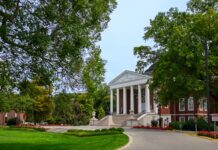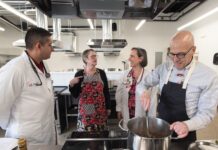
A group of students and faculty members from the University of Louisville’s Conn Center for Renewable Energy Research recently had the opportunity to participate in the Solar Decathlon Middle East competition in Dubai, United Arab Emirates.
The event, the largest solar decathlon competition for international universities, featured 14 international teams and took place Oct. 20 to Nov. 21 at the Mohammed bin Rashid Al Maktoum Solar Park. Over the last 2 years, teams designed and built high energy-efficiency, grid-connected, solar-powered houses, which were set up together in a public showcase village during the World Expo.
UofL teamed up with Higher Colleges of Technology, American University of Sharjah and American University in Dubai to form “Team Desert Phoenix.” The team fused talents of faculty, staff and students from all four universities to design, build and compete with a state-of-the-science 1,000-square-foot house. UofL’s Conn Center for Renewable Energy Research spearheaded this effort to promote the use of renewables, create the energy efficient house and involve over 10 faculty and 70 students in the international cooperative effort.
Each university provided expertise in engineering, architecture, water conservation and treatment, and project management during the design phase. Teams were challenged to work collaboratively to meet the competition deliverables, which included innovative engineering and architectural designs, construction management, and promotional media, websites and videos.
The students worked side by side with their professors and each other to transform designs and theories into fully functional solar-powered homes based on the competition’s seven pillars: sustainability, future, innovation, clean energy, mobility, smart solutions and happiness. GE Appliances/Haier was one of the sponsors that made it possible for the team to travel to the competition. As such, the Team Desert Phoenix house featured Haier washer and dryer units and a top-mount refrigerator.
“This project enabled broad exposure for Conn Center for Renewable Energy Research and University of Louisville in UAE and the Middle East,” said Professor Mahendra Sunkara, director of the Conn Center. “Through this effort, many universities in the region have a greater appreciation for the University of Louisville’s faculty and students in terms of the quality and academic leadership. We created an impactful experience while fostering future collaborations and exchanges, especially for those interested in our Master of Science and PhD programs.”
Cole Kidwell, a sophomore electrical engineering major, said the experience of working in a multi-disciplinary, international team was a reward in itself. Kidwell was inspired by getting to work with people from around the world toward a common goal.
“The experiential learning is invaluable,” Kidwell said. “Specifically in my field, we are taught to design and analyze solar systems. By participating from design through construction, testing and operation, I understand how all the parts work together in a more tangible way. I learned firsthand about power distribution in a solar-powered home, but also how teamwork is needed to realize every project.”
Grace Bank, a master’s degree student in structural engineering, appreciated the experience of working together as a team.
“We would not have succeeded in completing the home without working together. I gained experience in communication, teamwork and maintaining a positive environment under pressure. I also enjoyed figuring out real-life situations in a foreign culture,” Bank said. “Most of the issues we encountered are not presented in the classroom and can be more challenging to solve than the hardest equations we learn. Struggling helped me take a step back, evaluate the situation, and decide the next move to make. Nothing could be predicted, so it was nerve wracking and thrilling at the same time.”
Bank said the students came together under the stress of the build phase, when they learned to work in a “real-world situation with a real-world budget,” while getting the house constructed on time and competing. Overcoming project management challenges also created a bond for the team.
“Team Desert Phoenix was recruited late into the competition, had a full year less time to design and complete our home,” Kidwell said. “We rose to the challenge, including maintaining a rigorous, virtual, international presence with teammates in UAE. Our team worked very well together to overcome because we had a large student presence on site that was not afraid to put in manual labor and long hours to see the project to its finish. I am very proud to have been a part of a team with this level of determination.”
Out of eight teams that completed their projects, Desert Phoenix took seventh place in the competition. The UofL students and faculty were in Dubai for about two weeks in November for the last part of the build phase and the competition phase. In addition to competing, the UofL group was also able to tour Dubai’s buildings and beaches.
“Our biggest accomplishment was definitely finishing the house,” said Ximena Flores, a sophomore chemical engineering major who was part of the team. “This opportunity also introduced me to the Conn Center in a capacity that I had not known before. I look forward to potentially working on future Conn Center projects.”
Meghan Gregonis, the U.S. Consul General in Dubai, was one of the dignitaries who toured the house. She noted UofL as the competition’s sole U.S. participant and emphasized the partnerships with the American Universities in Dubai. The Counsel General expressed her pride in the students, their teamwork and the house at a time when sustainability bears on mitigating climate change.
Also on the Desert Phoenix team was Klemmer Nicodemus, chemical engineer and UofL undergraduate researcher, W. Mark McGinley, professor of civil and environmental engineering in the Speed School, and Andrew Marsh, assistant director for Conn Center.
“The logistic agility required to perform in this competition is intense,” said Marsh. “The solar decathlon experience challenges students to rise to the speed of business. To succeed, they must apply knowledge from the classroom yet bring focus as resilient people. We are incredibly pleased with the performance of the entire team, especially the commitment and leadership shown by students from UofL.”































